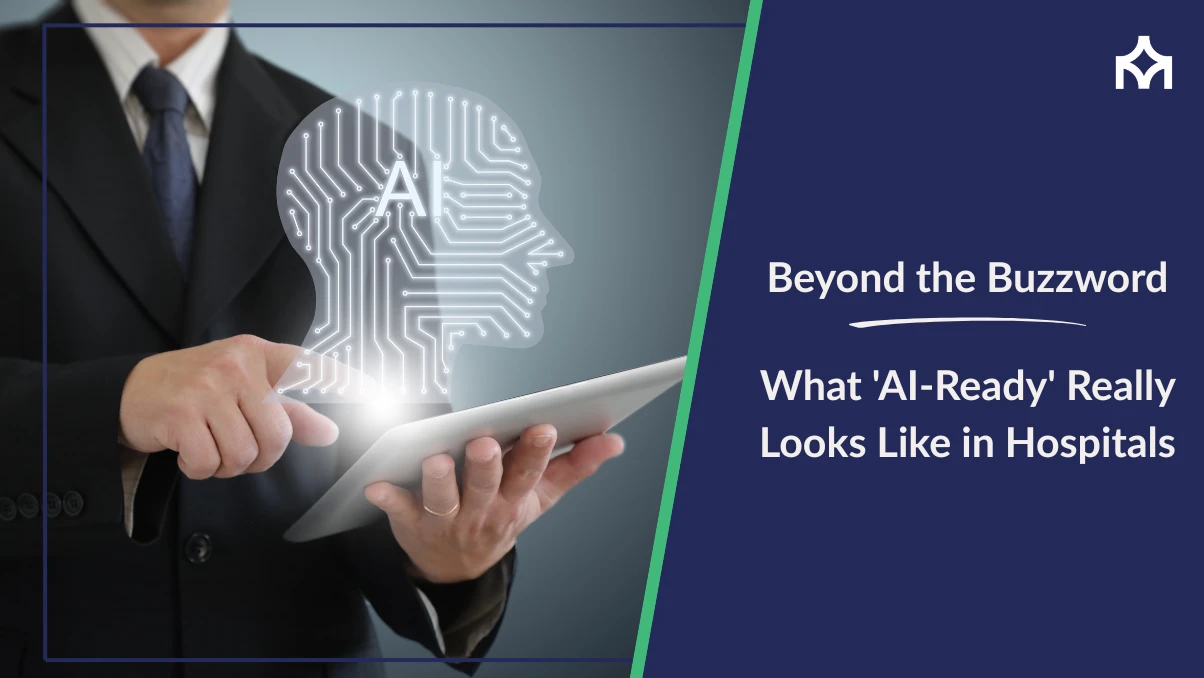Artificial Intelligence (AI) has become healthcare’s favorite buzzword, splashed across product launches, conference keynotes, and executive roadmaps. But being “AI-ready” is more than piloting a chatbot or adopting the latest imaging algorithm.
For hospital leaders navigating tightening budgets, rising patient expectations, and complex regulatory landscapes, AI-readiness is a rigorous benchmark. It's about ensuring the entire healthcare ecosystem—data, teams, workflows, and infrastructure—is prepared to harness AI’s true value.
So, what does AI-readiness really look like in 2025?
1. Clean, Secure, and Unified Data Infrastructure
At the core of every AI application lies data. But not just any data—AI needs high-quality, well-structured, and securely governed information to drive accurate outputs. AI-ready hospitals have integrated clinical, financial, and operational datasets using interoperability standards like HL7, FHIR, and SNOMED. They ensure real-time access through APIs and adopt zero-trust security models to protect sensitive patient information.
2. Interoperability That Delivers a “Single Source of Truth”
AI solutions falter when fed inconsistent or outdated information. Leading hospitals create centralized data hubs where departments—from radiology and pharmacy to admissions and administration—feed and extract real-time information. This “single source of truth” ensures that AI models reflect what’s really happening on the ground, improving decision support accuracy and enabling scalable innovation.
3. Workforce Empowerment, Not Replacement
AI isn’t about replacing clinicians; it’s about augmenting them. But without digital fluency across all departments, even the best tools can go unused.
AI-ready hospitals invest in upskilling not just for IT teams, but also frontline staff, case managers, and executives. Training includes clinical applications, data interpretation, bias awareness, and ethical AI usage. In fact, studies show hospitals with formal AI education programs see 2x greater tool adoption and improved staff satisfaction.
4. Embedded AI with Measurable ROI
AI must deliver beyond the demo. Hospitals that are truly AI-ready have integrated AI into core workflows like predictive bed planning, sepsis alerts, image triage, and claims automation. And they don’t stop at implementation—they track ROI through improved turnaround times, lower readmissions, and reduced manual workload.
Gartner reports that while 80% of hospitals use some form of AI, only 15% measure its impact consistently. Without tracking, the promise of AI often remains a marketing line rather than an operational reality.
5. Resilient, Compliant Infrastructure
From HIPAA to GDPR to local data laws in the GCC, AI-ready hospitals embed privacy and security into every layer of their tech stack. This includes role-based access control, multi-factor authentication, encrypted storage, and frequent audits.
MGA’s advisory framework helps hospitals meet these expectations while aligning AI tools with regulatory best practices and local compliance requirements.
What AI-Ready Looks Like In Practice
- Reduce diagnostic errors by up to 30% with NLP-powered documentation and radiology triage.
- Forecast surgical case volumes with >85% accuracy using predictive analytics.
- Lower administrative workload by 20–30% by using intelligent scheduling and automated claims processing.
- Reduce avoidable readmissions by 12–15% by using real-time AI warnings to proactively treat high-risk patients.
MGA’s Perspective
At MGA, we help hospitals move beyond the buzz and into real, measurable transformation. For us, being AI-ready means aligning three core pillars:
- People: Skilled, AI-literate teams across clinical and operational roles
- Process: Digitized, interoperable workflows that embed AI seamlessly
- Platform: Robust infrastructure that supports real-time analytics, automation, and secure innovation
By standardizing data, supporting multidisciplinary adoption, and setting clear KPIs, MGA can ensure that AI-readiness becomes a competitive advantage.
Final Take
The future of healthcare won’t be defined by who adopts AI the fastest—it will be led by those who implement it the smartest. In the post-COVID, value-driven era of healthcare, AI readiness isn't optional. It's how hospitals will survive, compete, and lead.
If your health system wants to move from fragmented innovation to scalable impact, ask not “Are we using AI?” but “Are we ready for it?”
Let MGA guide you from insight to execution—because in a world full of AI noise, readiness is everything.

